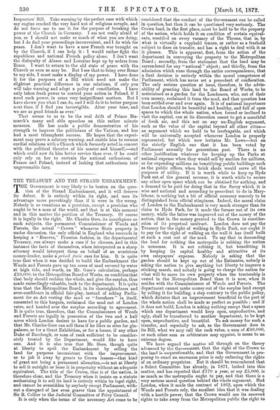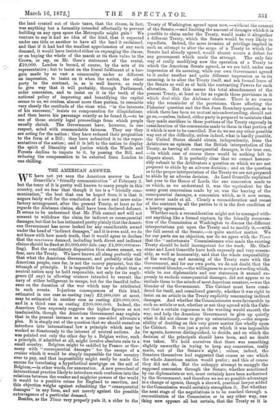THE TREASURY AND THE STRAND EMBANKMENT.
THE Government is very likely to be beaten on the ques- tion of the Strand Embankment, and it will deserve its defeat. It is entirely within its right, and uses its advantage more provokingly than if it were in the wrong. Nobody is so vexatious as a precisian, except a precisian who ought to be a man of the world, and that is at this moment and in this matter the position of the Treasury. Of course it is legally in the right. Mr. Charles Gore, its mouthpiece on such subjects, the permanent Commissioner of Woods and Forests, the actual " Crown " whenever State property is under discussion, the only official in England who succeeds in keeping a "Reserve," Prussian fashion, in the departmental Treasury, can always make a case if he chooses, and in this instance the facts of themselves, when interpreted as a sharp attorney would interpret them on behalf of an avaricious money-lender, make a prinul facie case for him. It is quite true that when it was decided to build the Embankment the Woods and Forests gave up ten acres of mud covered by water at high tide, and worth, on Mr. Gore's calculation, perhaps £10,000, to the Metropolitan Board of Works, on condition that that body should reclaim the whole, and give the surplus, thus made exceedingly valuable, back to the department. It is quite true that the Metropolitan Board, in its shortsightedness and over-confidence in official fair-play, instead of asking Parlia- ment for an Act vesting the mud or " foreshore " in itself, consented to this bargain, reclaimed the mud out of London rates, and handed over the surplus according to agreement. It is quite true, therefore, that the Commissioners of Woods and Forests are legally in possession of the two and a half acres which London desires to have for a public garden, and that Mr. Charles Gore can sell them if he likes as sites for gin- palaces, or for a Great Exhibition, or for a house, if any other Duke of Buccleugh, or man of rank sufficient to be consider- ately treated by the Department, would like to have one. And it is also true that Mr. Gore, though quite at liberty to spoil the Embankment by selling the land for purposes inconsistent with the improvement. or to job it away by grants to Crown lessees—that kind of grant not being a permanent alienation,—is not at liberty to sell it outright or lease it in perpetuity without an adequate equivalent. The title of the Crown, that is of the nation, is therefore clear, and the Treasury when it insists on a statute authorizing it to sell its land is entirely within its legal right, and cannot be overridden by anybody except Parliament, with- out a disregard of law even graver than the appointment of Sir R. Collier to the Judicial Committee of Privy Council.
It is only when the terms of the necessary Act come to be considered that the conduct of the Government can be called in question, but then it can be questioned very seriously. The Crown land, in the first place, must be held to be the property of the nation, which holds it on condition of certain equival- ents, resettled on every vacancy of the Throne, that is, by what is virtually a copyhold tenure, or rather as a freehold subject to fines on transfer, and has a right to deal with it as it pleases. This is apparent, first, from the action of the department in conveying the property to the Metropolitan Board ; secondly, from the statement that the land may be surrendered for any "national " object ; and thirdly, from the admission which runs through the entire correspondence, that a final decision is entirely within the moral competence of Parliament, which has never set a precedent of confiscation. The only serious question at issue, therefore, is the advis- ability of granting this land to the Board of Works, to be maintained as a garden for the Londoners, who, out of their own money, reclaimed it from the mud, and that question has been settled over and over again. It is of national importance that London should be beautiful and healthy, and full of open spaces to which the whole nation, when forced or inclined to visit the capital, can at its discretion resort to get a mouthful of fresh air, and this not on any un-English argument, such as the value of the capital beyond all other cities— an argument which we hold to be irrefragable, and which will be universally accepted whenever London is properly represented, but which now irritates Mr. Lowe—but on the strictly English one that it has been voted by Parliament annually for generations past. There is no other justification whatever for keeping up the Parks at national expense when they would sell by auction for millions, or for expending millions on beautifying public buildings such as the public offices, when brick sheds would serve all the purposes of utility. If it is worth while to keep up Hyde Park out,of the general revenue, it is worth while to secure any other open space which can be obtained for nothing, and a demand to be paid for doing that in the Savoy which it is wise and national and according to precedent to do in Mary- lebone, is nothing but a bit of official economy scarcely to be distinguished from official stinginess. Indeed, the moral claim of London to the Embankment is very much stronger than its claim to Hyde Park, for it made the former out of its own money, while the latter was improved out of the money of the nation, that is, the money granted to the Crown in consider- ation of its perpetual usufruct. London does not pay the Treasury for the right of walking in Hyde Park, nor ought it to pay for the right of walking on the wall it has itself built at such a cost out of the mud. To say that in demanding the land for nothing the metropolis is robbing the nation is nonsense. It is not robbing it, but benefitting it by keeping its capital healthy and attractive at its own ratepayers' expense. Nobody is asking that the garden should be kept up out of the Estimates, nobody is asking the nation to give anything but liberty to improve a stinking marsh, and nobody is going to charge the nation for what will be more its own property when the trusteeship is vested in the Metropolitan Board than it is now, when it resides with the Commissioners of Woods and Forests. The department cannot make money out of the surplus land except by selling it for building, a step contrary to the public policy, which dictates that an improvement beneficial to the port of the whole nation shall be made as perfect as possible ; and if it does not build, London is asking nothing except that a space which one department would keep open, unproductive, and ugly, shall be transferred to another department, to be kept open, unproductive, and beautiful. To ask money for such a transfer, and especially to ask, as the Government does in its Bill, what we may call the rack value, a sum of £40,000, or such other sum as arbitrators may appoint, is mean to an extreme degree.
We have argued the matter all through on the theory advanced by the Government, that the right of the Crown to the land is unquestionable, and that the Government in pro- posing to exact an enormous price is only enforcing the rights of an ordinary proprietor. But it should be remembered that a Select Committee has already, in 1871, looked into this matter, and has reported that £170 a year, or say £5,000, is as much as the metropolis ought to pay, and that there is a very serious moral question behind the whole argument. Had London, when it made the contract of 1862, upon which the Woods and Forests rely, the smallest idea that it was dealing with a hostile power, that the Crown would use its reserved rights to take away from the Metropolitan public the right to
the land created out of their taxes, that the clause, in fact, was anything but a formality intended effectually to prevent building on any open space the Metropolis might gain ? We venture to say it had no idea of the kind, that it expected under one title or another to have all the land it reclaimed, and that if it had had the smallest apprehension of any such demand, it would have insisted either on expunging the clause, or on buying the whole of the marsh at its then value to the Crown, or say, on Mr. Gore's statement of the rental, £10,000. London is bound, of course, by the acts of its representative ; but to insist on the literal fulfilment of a bar- gain made by so vast a community under so different an impression, to insist on it when the nation, the other party to the contract, is, as is well known, so ready to give way that it will probably, through Parliament, order concession, and to insist on it in the teeth of the national policy of improving and beautifying the capital seems to us, we confess, almost more than purism, to resemble very closely the rectitude of the vicar who, "in the interests of his successor," insists on compensation for dilapidations, and then leaves his parsonage exactly as he found it,—to be one of those strictly legal proceedings from which people usually shrink. The Government have, however, in one respect, acted with commendable fairness. They say they are acting for the nation ; they have reduced their proposition to the form of a Bill ; they have submitted it to the repre- sentatives of the nation; and it is left to the nation to display the spirit of liberality and justice which the Woods and Forests decline to impute to it, by passing the Bill, and reducing the compensation to be extorted from London to one shilling.



































 Previous page
Previous page